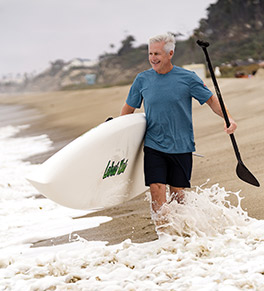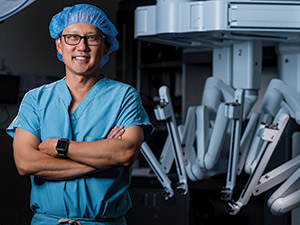Standing up to prostate cancer

"The fear is worse than the actual surgery,” says prostate cancer survivor Steve Mellem, who encourages all the men he knows to get regular checkups and PSA testing to catch problems early. Photos by Michael Der
Steve Mellem was the picture of health when a routine blood test showed his levels of prostate-specific antigens (PSA) had soared more than 260% in a single year, from 1.5 to 4. Concerned, his doctor sent him for further tests.
A community urologist detected lumps in a physical exam of Mellem’s prostate gland, another worrisome sign. Biopsy results were unequivocal: the San Clemente resident had become one of the more than 285,000 U.S. men diagnosed each year with prostate cancer, the second leading cause of cancer death after lung cancer.
Stunned by his diagnosis in the fall of 2021, the longtime surfer, paddleboarder and mountain bike rider didn’t know what course of treatment to choose. Many men, fearing that prostate surgery might leave them with poor urinary or sexual function, opt to postpone or even avoid treatment.
“Those complications were a real worry,” he recalls.
Mellem turned to Dr. David I. Lee, director of the UCI Health Comprehensive Prostate Cancer Program and one of the nation’s leading experts in robot-assisted prostatectomy. The procedure allows the surgeon to remove the prostate through tiny, keyhole incisions with greater precision than traditional open surgery.
With his extensive experience and pain reduction techniques, Lee is able to send many of his patients home the same day.
Assessing his options
Mellem immediately felt at ease with the surgeon’s candid yet reassuring explanation of the options, including radiation, chemotherapy and surgical removal of the prostate. Together, they concluded that surgery was the best choice after considering Mellem’s relatively young age and his specific diagnosis — early-stage cancer confined to the prostate.
“Dr. Lee told me that while there was still a risk of impotence or incontinence, if he could remove the prostate gland without having to cut anywhere else, I would have a great prognosis,” Mellem says.
Lee began performing robot-assisted prostate surgery two decades ago as a fellow at the UCI School of Medicine’s Department of Urology, which was among the first to develop the technique. Today, he is one of the foremost experts in the procedure.
“In order to become an expert at this, you really need to focus your attention on it,” he says. “I’ve done close to 7,000 of these operations.”
Improving recovery time
As he honed his skills, Lee also pioneered a technique to inject anesthetic into the area between the muscle walls of the abdomen instead of administering anesthetic from outside the abdominal wall.
A study showed that patients with this treatment had lower pain scores and needed less medication after surgery. That breakthrough has enabled Lee to turn the procedure into an outpatient surgery with faster, better recoveries.
The surgery may be robot-assisted, but it is Lee who guides the mechanical arms of the da Vinci Surgical System® with hand and foot controls, a pair of tiny video cameras giving him a three-dimensional view of what’s going on inside the patient’s abdomen. Improvements in surgical tools have enhanced surgeon dexterity and high-definition imagery.
“As you’re moving the instruments around, they almost feel like they’re your hands inside the patient,” Lee says.
Nerve-sparing technique
Those advances are important because removing a cancerous prostate is a delicate procedure. The surgeon must carefully cut and remove the organ while avoiding damage to muscle fibers surrounding the adjacent bladder.
Lee also uses a technique to protect the nerves connected to blood vessels in order to preserve sexual function. In patients with advanced cancer, it still may be necessary to remove those nerves.
“If the cancer has been caught early enough, we can carefully push those nerves aside while we’re removing the prostate, so they are preserved,” he says.
Lee is keenly aware of the psychological aspect of prostate surgery and recovery. “When men come to see us, they often don’t really have a good grasp of what’s going to happen, and it can be really scary and anxiety-producing,” he says.“Our experience in providing patients with accurate expectations for their outcomes makes a big difference in their comfort level.”
Prostatectomy isn’t for every patient. An older man with other health problems and a shorter life expectancy might opt for radiation instead. “But surgery is a great option for many men who seek a definitive treatment for prostate cancer,” Lee says.
'It couldn't have gone better'
Mellem checked in for surgery on March 30, 2022. About two hours later, Lee told Mellem’s wife that he had removed her husband’s prostate with clear margins and didn’t have to cut any nerves. That afternoon, the patient went home with a catheter to allow the new connection between his bladder and urethra to heal.
“It couldn’t have gone any better: the nurses were great, Dr. Lee was great,” Mellem recalls. “You feel like you’re on the same team, that he really cares.”
Now, two years since his diagnosis, Mellem remains cancer-free, his continence and sexual function intact. He’s back to enjoying water sports and surf fishing with his eight grandchildren.
He even has a new mission in life: encouraging other men to get regular checkups and PSA testing to catch problems early.
“The fear is worse than the actual surgery,” he explains. “There are no guarantees; you might get five more years or you might get 30 more years. But you want to make the most out of life.”
Mellem and his wife welcomed their ninth grandchild on Dec. 1. “I’ve been so blessed, it’s beyond belief.
“Life is good!”
Related stories
- Advancing surgical treatments for prostate cancer ›
- Riding tall a decade after prostate surgery ›
- Choosing active surveillance for prostate cancer ›






